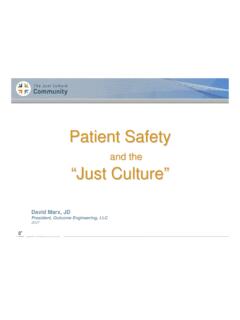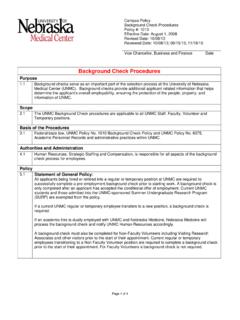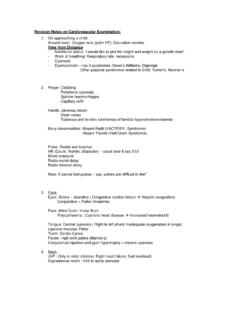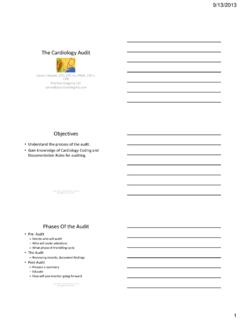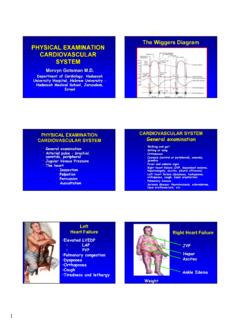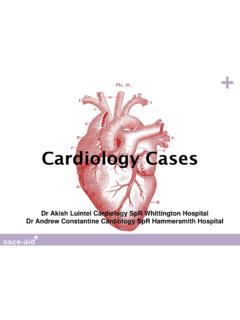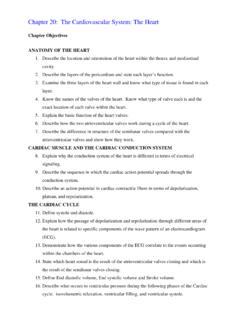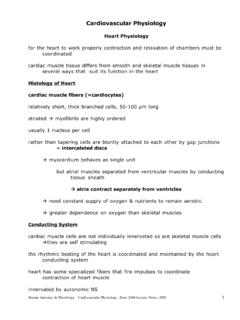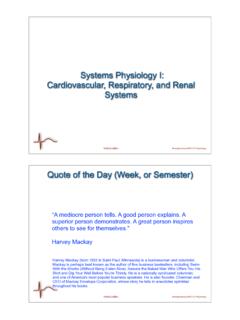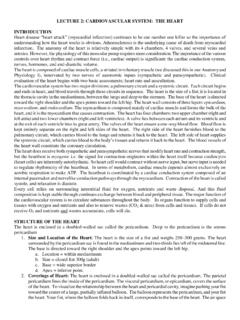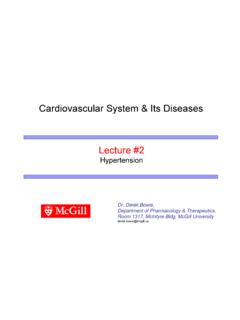Transcription of ROTATION SPECIFIC OBJECTIVES - University of Nebraska ...
1 ROTATION SPECIFIC OBJECTIVES University of Nebraska Internal Medicine Residency Program UNMC General cardiology ROTATION Educational OBJECTIVES : The house officer should gain an understanding of the pathophysiology, diagnostic evaluation, and therapeutic management of the most commonly encountered cardiac problems Technical skills to be mastered under appropriate supervision (all levels): o Electrical and chemical cardioversion of cardiac arrhythmias o Interpretation of EKG s o Interpretation of hemodynamic monitoring Clinic: The house officer is responsible for attending his or her regularly scheduled outpatient continuity clinics. Inpatient service at the Nebraska Medical Center: The General cardiology service is a busy inpatient service with two separate teams, one team is admitting cardiac patients (primary service) and the second team is responsible for inpatient cardiology consults (consultative service).
2 Each team has a faculty attending who will attend for one week, a fellow for the entire month, a case manager to aid in scheduling procedures and discharge coordination and two to three residents. Each internal medicine resident will be assigned to the primary service for 2 weeks and the consultative service for 2 weeks. The average census is 10-20 patients with four to six new admissions or consults daily. The residents will have primary responsibility on 4-6 patients when all residents are available, the fellow will coordinate the services and make sure the workload is evenly distributed as best as possible. Rounds typically begin at 9 am in the 7N conference room, Clarkson Tower. Rounds are attending dependent and may include walking rounds or formal sit down rounds followed by bedside rounds. It is generally expected that all patients will be seen prior to formal attending rounds.
3 Rounding times vary with each attending and their schedule. The fellow will help determine the time of rounds and notify the residents each week. Once assigned a patient, the resident is responsible for the initial evaluation of the patient (including written and dictated history and physical or consultation report) and the formulation of a plan of care with the guidance and direction of the fellow and staff physician when necessary. The resident is to inform their fellow or attending in a timely fashion if their patient is critically ill or needs an invasive procedure. At the end of the work day, the admitting resident is responsible for communicating vital information and patient care plans to the on-call resident or fellow. For primary cardiology patients, the admitting resident is also responsible for formulating a discharge plan, coordinating with other services involved in the discharge plan, communicating with the case manager to arrange appropriate follow-up, and in completing a discharge summary.
4 This plan should be relayed to any referring or primary physicians for the patient when possible. There is an electrophysiology/congestive heart failure service that is available as an elective to those who have had at least two months of general cardiology service and desire a more intense learning experience. Education: Supervision of medical students and other students assigned to the cardiology shall be the responsibility of the house officer in conjunction with the fellow. The resident will assist the attending staff and fellow in the education of students and in their evaluation when appropriate. Research and Reading: A general internal medicine textbook, Harrison s or Cecil s is a good source for background information to be used in conjunction with journal articles and Up To Date. Also, has the entire collection of ACC-AHA guidelines available for review. A list of suggested reading on cardiology topics is distributed two weeks prior to the start of the month.
5 Residents are encouraged to read about their patients diagnoses in order to be able to discuss these on rounds. Call Schedule: Tuwanda Mayberry, Fellowship Program Coordinator makes the call schedule. The residents generally take call no more than 6 times a month. All levels of house officer will work within the constraints of ACGME duty hour rules. They are always on call with a fellow and staff. The call schedule will not exceed more than every fifth or sixth night, on average, and will be in house call for HO I, HO II and HO III. Due to vacation requests, clinics and the number of house officers, you may be assigned to on-call when you are assigned to your continuity clinics. All admissions and consults should be discussed and or supervised with the fellow and, ultimately, the attending of record on call. When the resident is on call, he or she is on call for inpatients, admissions, and consults to the General cardiology service only.
6 The fellow takes call for the patients on the EP/CHF, Interventional and ACHD services as well as outpatient calls. The fellow is also responsible for taking admission and consult calls and distributing them to the on call resident. Conferences: There will be a daily didactic between 1-2 pm Monday thru Thursday designed for the house officers covering all the basic cardiology topics. The lectures are held in the Lied Conference Room 8707/8708 on the 8th floor of the Lied Transplant Center. Please make every effort to attend. In addition, the resident is highly encouraged to attend the 7 am Tuesday, Wednesday and Thursday morning conferences (7-8 AM in Lied conference room 8707/8708. The fellow will inform the residents of conferences that would be beneficial and relevant to their training. Attendance is also encouraged at the Catheterization Conference held every Tuesday from 4-5 PM in the Lied Conference Room, 87107/8708.)
7 Remember that house officers are also required to attend Internal Medicine Noon Conference Tuesdays and Thursdays, Grand Rounds every Friday in the Durham Research Center, and the periodic senior seminars held Tuesday evenings at 5:30 pm in the Eppley Science Hall as required by their department. Monday thru Friday at 2:30PM didactic sessions will take place. Competency-Based Educational Goals and OBJECTIVES by Level of Training: Medical Knowledge: PGY-1: Formulate appropriate differential diagnosis for common cardiology problems requiring hospitalization. Formulate appropriate diagnostic and treatment plans for common cardiology problems requiring hospitalization. Utilize written and electronic resources to learn more about patients diseases. Describe and employ cardiovascular disease prevention for the adult population. Learn and begin to practice Evidence Based Medicine.
8 PGY-2/3 Formulate appropriate differential diagnosis for complex cardiology problems requiring hospitalization. Formulate appropriate diagnostic and treatment plans for complex cardiology problems requiring hospitalization. Begin to teach basic topics in cardiology to medical students Master the practice of Evidence Based Medicine. Methods of Evaluation: Attending mid-month and end of ROTATION evaluation. Chart stimulated recall while on rounds. Review of in-training exam performance at 6-month evaluation. Patient Care: PGY-1: Demonstrate caring and respectful behaviors with patients and families. Prioritize patient s problems and develop management plans. Monitor and follow up of patients daily. Gather essential data through history taking and physical exam skills with emphasis on the CV system. Gather and interpret data from outside records and consultative services.
9 Recognize limits in clinical experience and know when / how to seek assistance. Recognize deterioration in clinical condition and take appropriate action (diagnostic and/or therapeutic). Specifically: o Understand the pathophysiology, prevalence and natural history of cardiac diseases. o Diagnosis and manage common cardiovascular diseases (coronary heart disease, congestive heart failure, cardiac arrhythmias, syncope, hypertension, hyperlipidemia and peripheral vascular disease). o Recognize and implement aggressive CV preventive medicine, including different screening methods. Recognize cardiac risk factors and implement appropriate preventative medicine strategies. o Understand and apply current ACC/AHA guidelines to patient care. o Understand the diagnostic and therapeutic roles of different CV procedures, invasive and non-invasive including their relative risks and benefits. PGY-2/3 All of the above and: Manage multiple patients with complex cardiovascular problems nearly independently.
10 Supervise the management of a team of patients. Elicit subtle cardiovascular physical exam abnormalities. Interact with all services caring for the patient (nursing, ancillary, social services, etc.). Methods of Evaluation: Direct observation (mini-CEX), nursing and patient feedback, attending evaluation Professionalism: PGY-1: Establish trust with patients and staff. Be honest, reliable, and cooperative and accept responsibility. Demonstrate respect, compassion, and integrity. Demonstrate sensitivity to patient culture, gender, age, preferences and disabilities. Acknowledge errors; take responsibility and work to minimize them. PGY-2/3: All of the above and: Display initiative and leadership. Demonstrate commitment to on-going professional development. Methods of Evaluation: 360 degree evaluation, direct observation, peer evaluation and attending evaluation Systems Based Practice: PGY-1: Work as an effective member of an interdisciplinary team.
